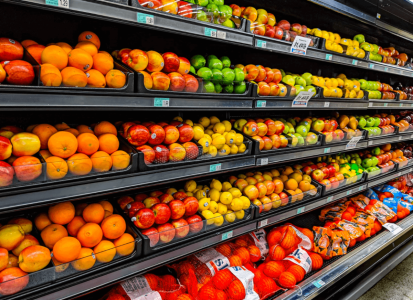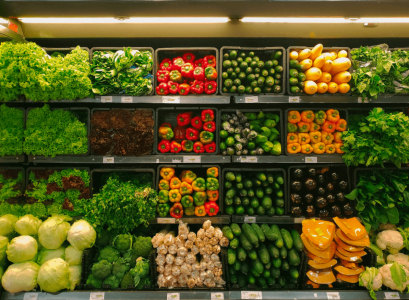Are supermarket trolleys influencing us?
- Replies 8
Taking care of ourselves is super important, especially as we age. We all want to feel good and stay healthy, right?
But, honestly, it can be tough to make healthy choices when surrounded by so many tempting options. Everywhere we turn, there's another fast food location or a shelf stacked high with sugary snacks.
If you've ever wandered down the aisles of your local supermarket, you know what we're talking about. It can feel like an uphill battle when junk food is front and centre, and the healthier options are hidden.
It's not just a personal challenge, either. These stores have a huge impact on our overall eating habits as a society. Supermarkets and grocery stores play a massive role in the retail food market - they have a lot of power over what we eat.
And that's a problem when you consider the fact that so few of us are getting enough fruits and veggies in our diets. Despite the recommended daily intake of two servings of fruit and five servings of veggies, most adults aren't even coming close.
It's a challenging situation, but there are ways to start making positive changes.

But did you know our diet choices may be more flexible than we thought? According to a recent study published in the Nutrition Bulletin, we can change our eating habits for the better.
To nudge customers towards healthier choices, researchers from the Nutrition Bulletin decided to conduct a unique test at a local supermarket. And the exciting news? The results were positive!
The study involved fitting thirty out of roughly one hundred shopping carts at an independent supermarket in Melbourne's Essendon Fields with placards featuring the message: 'More than nine out of 10 shoppers buy fruits or vegetables at each shop.'
After analysing the data and sales results, the researchers found that customers who used these specially marked carts spent an average of $9.10 more on fruits and vegetables than the average shopper - that's equivalent to 1.25 kilograms of healthy produce!

Study author Greg McGrath believes this method could have huge potential benefits. Not only could it help shoppers improve their nutrition, but it could also boost profits for supermarkets. Talk about a win-win situation!
'My advice would be to keep the placards installed for a full month and then take them away, and then reintroduce them three or four months after,' he said, adding: 'If supermarkets did that for a year, they could make maybe $150,000 with a few thousand dollar investments.'
The benefits of encouraging healthy eating habits extend far beyond the financial gains for supermarkets. By promoting the consumption of fruits and vegetables, this approach could potentially reduce people's risk of developing chronic diseases such as diabetes, heart disease, and cancer in the long term.
However, it's worth noting that more extensive research is needed to confirm these results fully.
Dr McGrath's study was conducted at a single supermarket on a single day, and it's unclear whether these findings would hold up across a larger sample size or over a longer period of time.

Interestingly, some of Australia's largest retailers, including Coles, Woolworths, and ALDI, declined to participate in the study due to concerns about sharing information with competitors.
But Dr McGrath remains optimistic that he can convince these retailers to join in future research efforts.

Now it's time for you to weigh in, members! Could placards in supermarket trolleys be an effective way to encourage healthier eating habits? Would you be more likely to choose fruits and vegetables if you saw a message reminding you that most other shoppers are doing the same?
And while we're on the topic of healthy shopping habits, do you have any other tips or tricks that help you resist impulse purchases and stick to your health goals? Share your thoughts in the comments below, and let's help each other create a healthier future!
But, honestly, it can be tough to make healthy choices when surrounded by so many tempting options. Everywhere we turn, there's another fast food location or a shelf stacked high with sugary snacks.
If you've ever wandered down the aisles of your local supermarket, you know what we're talking about. It can feel like an uphill battle when junk food is front and centre, and the healthier options are hidden.
It's not just a personal challenge, either. These stores have a huge impact on our overall eating habits as a society. Supermarkets and grocery stores play a massive role in the retail food market - they have a lot of power over what we eat.
And that's a problem when you consider the fact that so few of us are getting enough fruits and veggies in our diets. Despite the recommended daily intake of two servings of fruit and five servings of veggies, most adults aren't even coming close.
It's a challenging situation, but there are ways to start making positive changes.

Supermarkets have a lot of influence over the food choices that consumers make. Credit: Unsplash/gemma.
But did you know our diet choices may be more flexible than we thought? According to a recent study published in the Nutrition Bulletin, we can change our eating habits for the better.
To nudge customers towards healthier choices, researchers from the Nutrition Bulletin decided to conduct a unique test at a local supermarket. And the exciting news? The results were positive!
The study involved fitting thirty out of roughly one hundred shopping carts at an independent supermarket in Melbourne's Essendon Fields with placards featuring the message: 'More than nine out of 10 shoppers buy fruits or vegetables at each shop.'
After analysing the data and sales results, the researchers found that customers who used these specially marked carts spent an average of $9.10 more on fruits and vegetables than the average shopper - that's equivalent to 1.25 kilograms of healthy produce!

The idea of using trolleys as a health engagement tool is a novel one. Credit: Unsplash/Markus Spiske.
Study author Greg McGrath believes this method could have huge potential benefits. Not only could it help shoppers improve their nutrition, but it could also boost profits for supermarkets. Talk about a win-win situation!
'My advice would be to keep the placards installed for a full month and then take them away, and then reintroduce them three or four months after,' he said, adding: 'If supermarkets did that for a year, they could make maybe $150,000 with a few thousand dollar investments.'
The benefits of encouraging healthy eating habits extend far beyond the financial gains for supermarkets. By promoting the consumption of fruits and vegetables, this approach could potentially reduce people's risk of developing chronic diseases such as diabetes, heart disease, and cancer in the long term.
However, it's worth noting that more extensive research is needed to confirm these results fully.
Dr McGrath's study was conducted at a single supermarket on a single day, and it's unclear whether these findings would hold up across a larger sample size or over a longer period of time.
Key Takeaways
- Research has found that 'social nudges' placed in supermarket trolleys could influence shoppers to buy more fruit and vegetables.
- For the study, a message was placed in 30 of about 100 trolleys encouraging shoppers to buy more fruit and vegetables.
- If this preventative approach to health was kept up, it could also help reduce people's risk of developing conditions such as diabetes, heart disease and cancer in the long term.
Interestingly, some of Australia's largest retailers, including Coles, Woolworths, and ALDI, declined to participate in the study due to concerns about sharing information with competitors.
But Dr McGrath remains optimistic that he can convince these retailers to join in future research efforts.

Fresh produce is more difficult to market than unhealthy foods as it can't be trademarked, and its price is determined by seasonal and weather conditions. Credit: Unsplash/nrd.
Now it's time for you to weigh in, members! Could placards in supermarket trolleys be an effective way to encourage healthier eating habits? Would you be more likely to choose fruits and vegetables if you saw a message reminding you that most other shoppers are doing the same?
And while we're on the topic of healthy shopping habits, do you have any other tips or tricks that help you resist impulse purchases and stick to your health goals? Share your thoughts in the comments below, and let's help each other create a healthier future!







